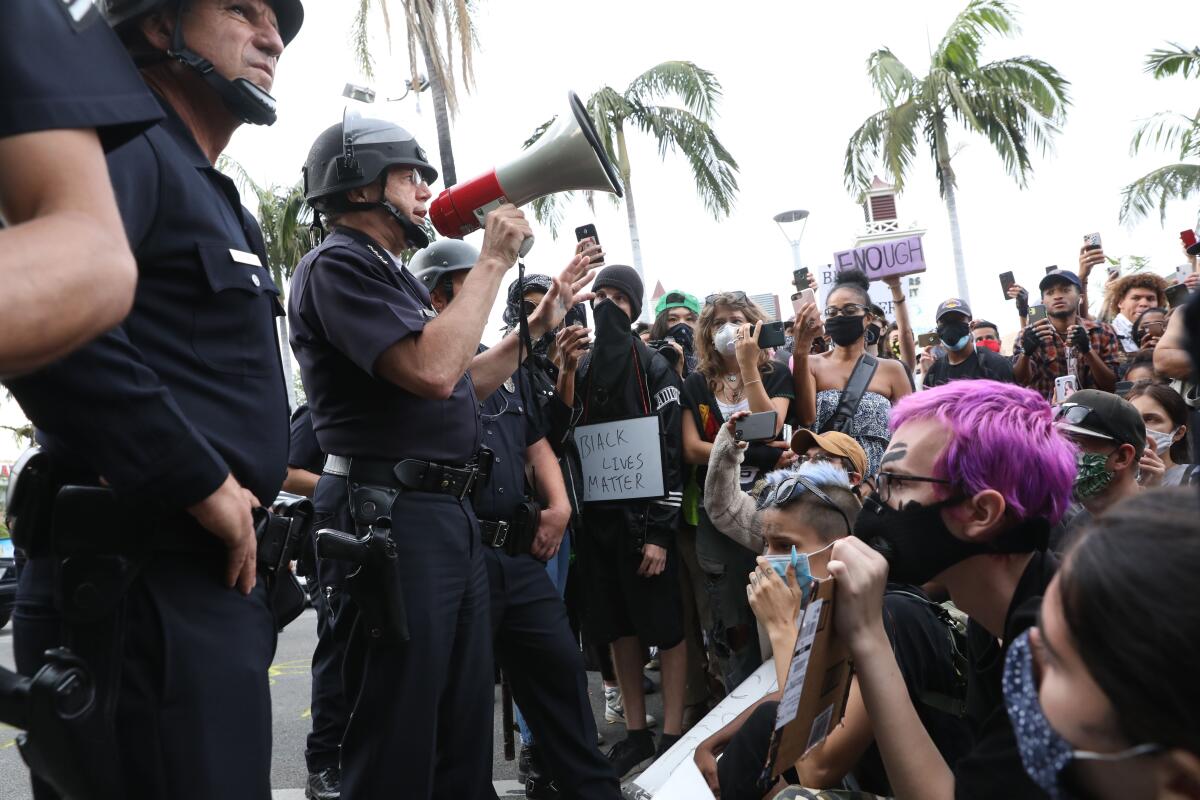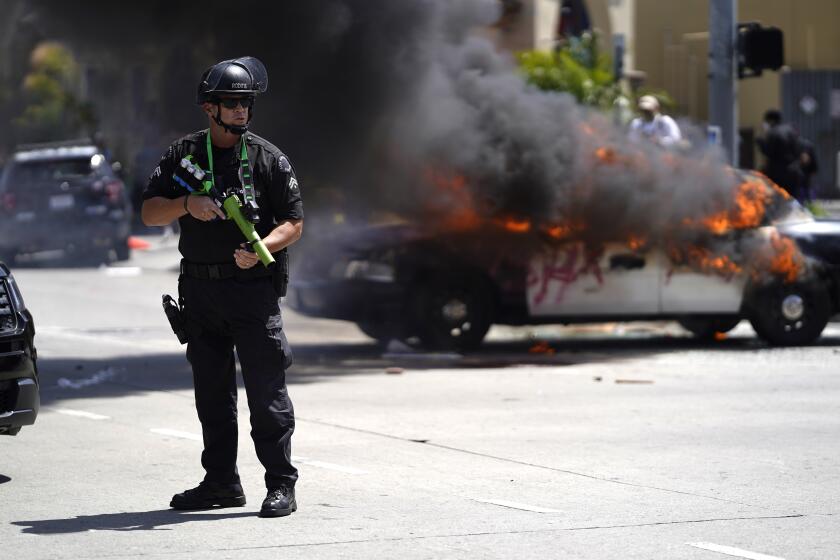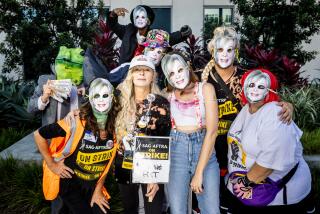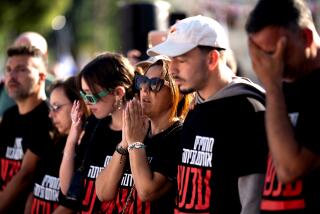Solidarity, or joining the âbandwagonâ? Some corporate activism backfires amid protests

It was a cascade of solidarity messages from some of the biggest players in entertainment and tech.
Netflix, CBS and Amazon were among those that took to social media and sent heartfelt messages to employees this weekend to demonstrate their support for the Black Lives Matter movement as protests ran through the country. But it didnât go as planned for all of them.
Los Gatos-based streaming giant Netflix, which has supported the work of black creators such as Shonda Rhimes and Spike Lee, was among the first entertainment companies to post support for the Black Lives Matter movement.
On Saturday, it tweeted, âto be silent is to be complicit. Black lives matter.â The company added that it had a duty to its African American customers, employees, creators and performers to speak up. Director Ava DuVernay replied, âWell done.â
Some companies, however, faced skepticism over their commitment to the cause. On Sunday, Amazon, whose studio is a big employer in Los Angeles, tweeted: âtogether we stand in solidarity with the Black community.â Civil rights campaigners such as the American Civil Liberties Union and Fight for the Future used the tweet to point out that Amazonâs Ring camera-enabled doorbell has partnered with police departments, raising concerns about the risks to privacy and racial profiling.
Amazon had no immediate comment.
CBS declared its support for the demonstrations in a post on Twitter but was met with questions about why its former Los Angeles headquarters was being used by police. âStand in solidarity with actions, not posts,â wrote Carina Adly Mackenzie, creator of the CW sci-fi series âRoswell, New Mexico,â which is coproduced by CBS Television Studios.
CBS has made a push to increase the diversity in its programming, with series such as âThe Neighborhoodâ and âAll Rise,â after being criticized for making shows with mostly white leading roles.
âSo many corporations with supportive messages,â director Stella Meghie said in a tweet. âPlease also feel free to address the anti-blackness within your own companies â hire more of us, listen to us, promote us, pay us more and check the rampant microagressions faced by the Black employees and creatives you do employ.â
CBS sold the Fairfax-based television studios complex last year. âCBS does not own or operate Television City,â spokesman Chris Ender said in a statement. âWe sold the production facility and campus to Hackman Capital in December 2018.â It still uses studios at the facility such as for âThe Late Late Show With James Cordenâ and rents offices for executives.
The backlash in some cases highlights the perils for entertainment companies and brands as they speak out on social issues, in part to court younger consumers. Studios that havenât already shown an active role in diversifying their ranks risk alienating consumers. And social media users will be quick to highlight double standards in public forums.
âCompanies that have not in the past demonstrated that they are through and through a purpose-driven company ... they are perceived as inauthentic, as jumping on the bandwagon,â said Americus Reed, marketing professor at the University of Pennsylvania âs Wharton School of Business.
The weekend protests calling for justice after the death of George Floyd, which sometimes turned violent, touched many cities across the U.S. and abroad. Now, entertainment companies such as Live Nation and Spotify are focusing efforts on the so-called Blackout Tuesday, pausing operations in support. Spotify will create playlists but also ask employees to take time to educate themselves on the issues.
Corporate marketing and public relations departments have traditionally shied away from making political statements because of a potential backlash.
âIâve always told my students and clients itâs not a good idea to mix politics and business. Itâs usually going to get you into trouble,â said Ira Kalb, an assistant professor of clinical marketing at USCâs Marshall School of Business.
Taking a stance on social issues can pay off for some companies, however. After Nikeâs use of Colin Kaepernick in ads, when some consumers were burning its shoes in anger over the quarterbackâs civil rights efforts, the companyâs share price rose.
Nikeâs stock price rose because it âmade a decision not to be on the sidelines,â Reed said. âAnd to differentiate (its) brand on the basis of values.â
Nike put out an antiracism ad in wake of Floydâs death May 25 in Minneapolis during an arrest. Other companies such as Facebook and exercise technology firm Peloton also issued statements on Floydâs death and donated money to social justice causes.
Now, being an entertainment company with a young, digital savvy audience means having to draw a line in the sand on social issues like race.
âThe younger consumer is already thinking about âWhat do you stand for?ââ said Reed. â âI donât want to know just what you do, I want to know what are your values, how do you treat your employees, what do you do to the environment.ââ
George Floyd protesters march toward Beverly Hills, demand justice
Disney, WarnerMedia and Sony were among the major Hollywood studios writing openly to their staffs. Executives at Disney â whose streaming unit Hulu and superhero movie studio Marvel also tweeted support for the protests â wrote to employees that they âtoo, are struggling to make sense of the recent tragedies that leave us feeling overcome with sorrow.â
âWhile we donât have all the answers, we resolve to use our compassion, our creative ideas and our collective sense of humanity to ensure we are fostering a culture that acknowledges our peopleâs feelings and their pain,â the statement read. âWe also realize that now more than ever is the time for us all to further strengthen our commitment to diversity and inclusion everywhere.â
WarnerMedia television networks changed their Twitter handles to read â#BlackLivesMatter.â Warner Bros., the Burbank-based movie and TV studio, posted a quote from lawyer and social justice activist Bryan Stevenson, who was played by Michael B. Jordan in the 2019 Warner Bros. movie âJust Mercy.â
âSomebody has to stand when others are sitting. Somebody has to speak when others are quiet,â the company quoted Stevenson as saying.
People of color remain vastly underrepresented both in front and behind the camera, various studies have shown.
Of the 113 directors of the top 100 films in 2019, 83.2% were white and 16.8% were from underrepresented race or ethnic groups, down from 21.4% in 2018 and substantially below the U.S. census of 39.6%, according to a study by the USC Annenberg Inclusion Initiative.
Black creators also called this weekend for Hollywood to address the way people of color are represented on-screen. Franklin Leonard, who created the Black List of unpublished screenwriters, called on Hollywood to tackle its role propagating the image of people of color as criminals.
âIt is WELL past time for Hollywood to begin to grapple with the extent to which it has and continues to mythologize, valorize, and reinforce white supremacy,â he tweeted.
More to Read
Inside the business of entertainment
The Wide Shot brings you news, analysis and insights on everything from streaming wars to production â and what it all means for the future.
You may occasionally receive promotional content from the Los Angeles Times.













